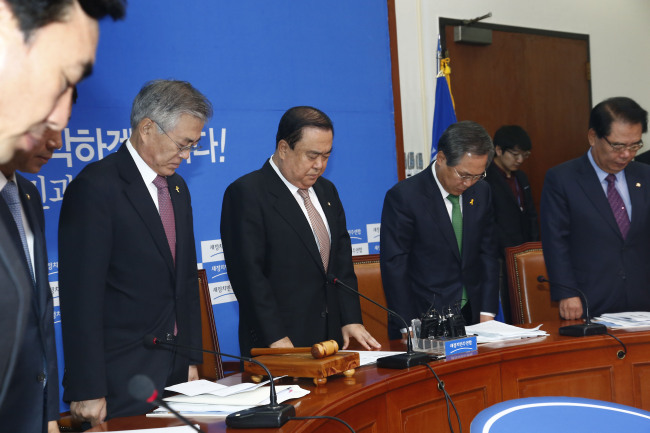Public safety has once again gripped the National Assembly with the recent ventilation shaft accident making the ruling and opposition parties hone in on related issues.
On Friday, grates covering a ventilation shaft collapsed under the weight of people watching a K-pop performance in Techno Valley in Seongnam, Gyeonggi Province. The accident killed 16 people, and injured 11, eight of whom are said to be in critical condition.
 |
Main opposition New Politics Alliance for Democracy’s interim leader Rep. Moon Hee-sang (third from right) leads lawmakers in a moment of silence for the casualties of Friday’s K-pop concert accident at the National Assembly on Monday. (Yonhap) |
Lawmakers of both ruling Saenuri Party and the main opposition New Politics Alliance for Democracy on related parliamentary committees highlighted the lax safety standards at Monday’s parliamentary audit.
The matter of sinkholes, which surfaced as a major concern in Seoul following the appearance of a large hole in southern Seoul near earlier this year, became a major talking point.
“Although no lives were lost, caveins with areas of more than 1.2 square meters, and depths of over 1 meter have continued to occur over the past five years,” Saenuri Party’s Rep. Lee Un-ju said at the parliamentary audit of Seoul Metropolitan Government Monday.
She also revealed that 21 sinkholes measuring 2 meters by 2 meters have appeared since 2010.
Potential sinkholes may be strewn across the capital.
According to Rep. Kim Sang-hee of the NPAD, the level of groundwater around Seoul has changed drastically, with the level dropping by as much 16.1 meters in some areas.
Indiscriminate development leading to the loss of groundwater, and corrosion from damaged water pipes have been pointed to as potential causes of underground hollows, which in turn cause the surface to collapse.
While growing concerns over safety have brought the rival parties to focus on the same issue, the interparty wrangling continues. They are taking very different approaches.
The main opposition party is using the opportunity to raise the attack on the government, calling the accidents the Park Geun-hye administration’s fault.
“Another accident has happened in Pangyo Techno Valley. What (has the government) done in the six months since the Sewol tragedy. (The Pangyo incident) is something that would happen in undeveloped countries,” NPAD interim leader Rep. Moon Hee-sang said.
“The government must conduct a nationwide assessment to prevent future accidents.”
The ruling party, for its part, is raising the pressure on the NPAD to conclude the negotiations on bills that were proposed in the wake of the April 16 Sewol ferry disaster.
“There are no ruling and opposition parties when it comes to the safety of the people,” Saenuri Party floor leader Rep. Lee Wan-koo said, calling on the NPAD to cooperate on developing related policies.
Lee, however, went on to comment on the special Sewol bill and others pending legislations over which his party and the NPAD have been deadlocked for months. The two parties launched special task forces on three bills ― Government Organization Act revision, Sewol bill and the so-called Yoo Byung-eun act ― but it is unclear whether they will be passed by the target-date of end-October.
By Choi He-suk (
cheesuk@heraldcorp.com)








